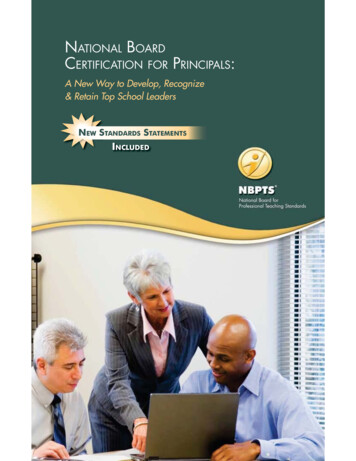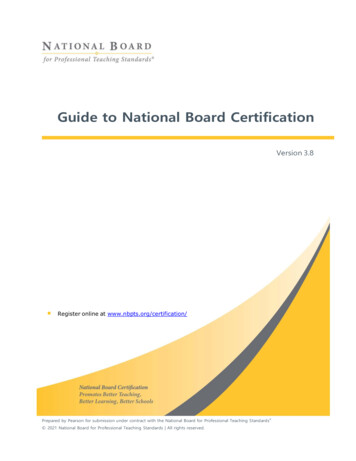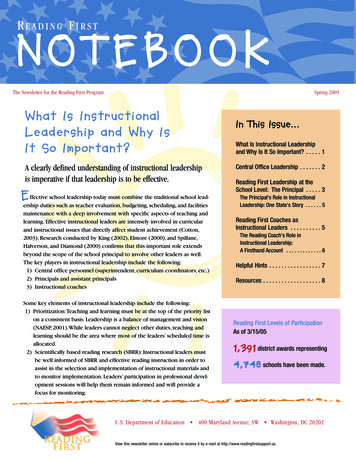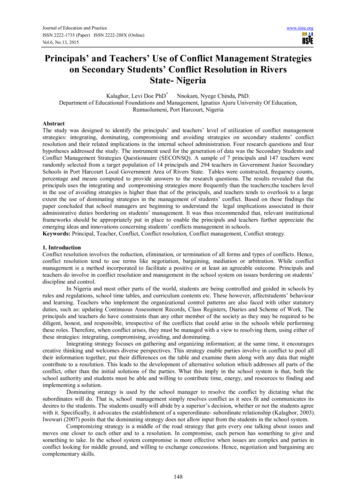
Transcription
NATIONAL BOARDCERTIFICATION FOR PRINCIPALS:A New Way to Develop, Recognize& Retain Top School LeadersNEW STANDARDS STATEMENTSINCLUDED
REDEFININGNATIONAL BOARD CERTIFICATION FOR PRINCIPALS:EDUCATIONAL LEADERSHIP FOR THE 21ST CENTURYEffective principals are critical to the success of students, teachers and entire schools.A successful principal creates a culture of learning that: Advances student learning and engagement. Recruits and retains the best teachers. Improves teacher and school performance.To create a consistently reliable process to develop, recognize and retain effective principals,the National Board for Professional Teaching Standards (NBPTS) has announced an initiativeto develop National Board Certification for Principals.National Board Certification for Principals, the first national certification program focusedon principals, is also the first phase of an expanded umbrella program, National BoardCertification for Educational Leaders, which builds on the National Board’s 20-year, highlysuccessful program, National Board Certification for teachers and school counselors. NationalBoard Certification for Educational Leaders not only creates standards and an assessment processfor principals, it also lays the groundwork for a new educator-leadership initiative for assistantprincipals, teachers and other school-based educators who positively impact the culture oflearning in schools.VALIDATING WHAT MAKESANEFFECTIVE PRINCIPALNational Board Certification for Principals will define and validate the requirements thatidentify an accomplished, effective and results-oriented principal. As in medicine, law andother fields, National Board Certification for Principals will support excellence, motivation andprestige within the profession. The National Board’s analysis shows that principals support theprospect of advanced certification that recognizes the importance of instructional leadership,organizational change and community involvement—as well as the principal’s essential role inschool management. In a recent NBPTS survey, 83 percent of school leader respondents and69 percent of district leader respondents expressed interest in advanced principal certification.Both school- and district-level leaders were most interested in a certification that would betterprepare principals to lead systemic instructional improvement.National Board Certified Teachers throughout the nation recognize the importance ofschool based leadership in creating a culture of learning and supporting accomplishedteachers. Reports from a series of state and national summits on supporting and staffinghigh-need schools, attended by hundreds of NBCTs, ranked school-building leadershipamong the most important factors in recruiting and retaining accomplished teachers andadvancing student learning.
GROWING INTEREST NATIONWIDEINNATIONAL BOARD CERTIFICATIONFORPRINCIPALSThere is further evidence of interest in National Board Certification for Principals.Several states are working to identify and recognize principals who are performing atan accomplished or advanced level.NBPTS has built on these and other leadership improvement efforts by convening keyexperts and groups representing principals, teachers, national organizations and other stakeholdersto develop core propositions and standards for the advanced certification. Nearly 7,500 educatorsnationwide (half of them principals) participated in the developmental process or providedfeedback. Through this process, just as it did for teaching, NBPTS is ensuring that NationalBoard Certification for Principals is a high-quality and unified effort that moves practitionerstoward common goals.NBPTS: THE RIGHT TEAMNBPTS has a record of developing advanced standards and rigorous assessments that arerecognized in all 50 states and the District of Columbia. Similarly, NBPTS is recognizedfor having the capacity to define excellent practice for educational leaders and implement aresearch-based, nationwide certification.In June 2008, the National Research Council (NRC) of the National Academies affirmedthat NBPTS and its advanced teacher certification program have had a positive impact onstudent achievement, teacher retention and professional development. The NRC study foundthat students taught by National Board Certified Teachers make higher gains on achievementtests than students of non-board-certified teachers.Successful students and teachers need the support of effective school leadership. The mostaccomplished principals create a school-based learning community that involves teachers,students, parents and the community. In addition, the demands and complexity of 21st centuryeducation require more from these leaders. As many current principals approach retirement age,it is essential to attract, develop and retain the best and the brightest educational leaders to theprofession to prepare students for the expectations of a global economy.SIGNUP FOR MORE INFORRMATTIONN ANDD UPPDAATES.Visit www.nbpts.org/principals to learn moreand to receive regular updates as theNational Board reaches milestones in the developmentof the new National Board Certification of Principals.Visit www.nbpts.org/teacherleaders to learn more andreceive information about the teacher leader initiative.
NATIONAL BOARD CORE PROPOSITIONSFOR ACCOMPLISHED EDUCATIONAL LEADERS The Core Propositions for Accomplished Educational Leaders, adopted by NBPTS in2009, are the first step in building this landmark program capture the essence of whataccomplished educational leaders should know and do at a consistently high level. Theydefine the essential elements of accomplished educational practice for leaders that establisha vision of the future.The Core Propositions are the bedrock upon which the certifications for educationalleaders are built. From them, stakeholders have completed the specific, detailed standards andwill develop evidence-based assessments that will certify educational leaders as accomplished.The core propositions define the fundamental skills, central applications and overarchingdispositions for such leaders. While accomplished educational leaders’ practice mustembody all nine core propositions, such leaders draw on varying combinations of theseskills, applications and dispositions to best meet the distinct demands of their learningcommunities.“I have been a supporter of NBPTS since my days as a schoolsuperintendent in Fairfax County, Virginia. I learned firsthandthe impact that board-certified teachers have on student learningand achievement. Now, as the executive director of the AmericanAssociation of School Administrators, I fully recognize the criticalimportance of effective leadership in our schools.”—Daniel A. Dommenechh, exeecuttiveve dirrectorr,Ammerican Associatiion off Schoool Adminiistrattorrs“Once the assessment is developed, principals who go throughthe certification process will become better at what they do.”—Victoria Dixoon-Mokeeba, NBBCT, head of schooll andd lead teacher,Carolina School for Inqquiry, Coluumbbiaa, Soouthh Carolina“If we are going to improve our nation’s schools, it is absolutelycritical that we have the best principals in these schools leadingthe teaching and learning process.”—CCarl Harrris, deeputy assisstannt secrretarry,nt of EduucaationnU.S. Deparrtmen(former superrintendennt, Durrham Publlic Schhoolls, Norrthh Carolina)
National Board Core Propositionsfor Accomplished Educational Leaders Skills1. Accomplished educational leaders continuously cultivate their understanding ofleadership and the change process to meet high levels of performance. (Leadership)2. Accomplished educational leaders have a clear vision and inspire and engagestakeholders in developing and realizing the mission. (Vision)3. Accomplished educational leaders manage and leverage systems and processesto achieve desired results. (Management)Applications4. Accomplished educational leaders act with a sense of urgency to foster a cohesiveculture of learning. (Culture)5. Accomplished educational leaders are committed to student and adult learnersand to their development. (Learners and Learning)6. Accomplished educational leaders drive, facilitate and monitor the teaching andlearning process. (Instruction)Dispositions7. Accomplished educational leaders model professional, ethical behavior and expectit from others. (Ethics)8. Accomplished educational leaders ensure equitable learning opportunities and highexpectations for all. (Equity)9. Accomplished educational leaders advocate on behalf of their schools, communitiesand profession. (Advocacy)Copyright 2009 NBPTS. All Rights Reserved. DO NOT duplicate, transmit, or reproduce this documentin part or in whole in any form, including electronic, without the express written consent of NBPTS.
NATIONALSTANDARDS STATEMENTSBOARD CERTIFICATION FOR PRINCIPALSNational Board Standards for Accomplished Principals represent a professional consensuson the unique practices that distinguish accomplished principals. These standards arecast in terms of the collaborative actions these principals take to advance learning to thehighest level for every child: to recruit, engage, promote and retain accomplished teachers; toimprove school culture and performance; to advocate for the profession and the needs of theirschool; and to purposefully engage families and the broader community in the school’s visionand mission. The standards reflect the nine Core Propositions for Educational Leaders, whichform the foundation and frame the rich amalgam of knowledge, skills and dispositions thatwill characterize National Board Certified Principals.NBPTS recognizes that accomplished principal practice appears in many forms andenvironments and that there is no single “right” way to be an accomplished principal leader.The standards characterize critical aspects of the outstanding practice of accomplishedprincipal leaders. The standards statements presented below were approved by the NBPTSBoard of Directors in February 2010.Standard I: Leadership for ResultsAccomplished principals lead with a sense of urgency and achieve the highestresults for all students and adults. They build organizational capacity by developingleadership in others. These dynamic, forward-thinking principals lead collaborativeorganizations that realize and sustain positive change that enhances teacher practiceand improves student learning.Standard II: Vision and MissionAccomplished principals lead and inspire the learning community to develop,articulate, and commit to a shared and compelling vision of the highest levelsof student learning and adult instructional practice. These principals advancethe mission through collaborative processes that focus and drive theorganization toward the vision.Standard III: Teaching and LearningAccomplished principals ensure that teaching and learning are the primaryfocus of the organization. As stewards of learning, these principals lead theimplementation of a rigorous, relevant, and balanced curriculum. They workcollaboratively to implement a common instructional framework thataligns curriculum with teaching, assessment, and learning, andprovides a common language for instructional quality that guidesteacher conversation, practice, observation, evaluation, andfeedback. They know a full range of pedagogy and makecertain that all adults have the knowledge, skills, anddispositions necessary to support student success.
Standard IV: Knowledge of Students and AdultsAccomplished principals ensure that each student and adult in the learningcommunity is known and valued. These principals develop systems so thatindividuals are supported socially, emotionally, and intellectually, in theirdevelopment, learning, and achievement.Standard V: CultureAccomplished principals inspire and nurture a culture of high expectations, whereactions support the common values and beliefs of the organization. These principalsbuild authentic, productive relationships that foster a collaborative spirit. They honorthe culture of the students, adults, and larger community, demonstrating respect fordiversity and ensuring equity. They create and maintain a trusting, safe environmentthat promotes effective adult practice and student learning.Standard VI: Strategic ManagementAccomplished principals skillfully lead the design, development, and implementationof strategic management systems and processes that actualize the vision and mission.These principals lead the monitoring and adaptation of systems and processes toensure they are effective and efficient in support of a high-performingorganization focused on effective teaching and learning.Standard VII: AdvocacyAccomplished principals effectively advocate internally and externally to advancethe organization’s vision and mission. These principals strategically seek, inform,and mobilize influential educational, political, and community leaders to advocatefor all students and adults in the learning community.Standard VIII: EthicsAccomplished principals are ethical. They consistently demonstrate a high degreeof personal and professional ethics exemplified by integrity, justice, and equity.These principals establish a culture in which exemplary ethical behavior ispracticed by all stakeholders.Standard IX: Reflection and GrowthAccomplished principals are humble lead learners who make their practice publicand view their own learning as a foundational part of the work of school leadership.They are reflective practitioners who build on their strengths and identify areasfor personal and professional growth. They adapt their paradigm and practice toresult in improved student performance and enhanced teacher instructionthrough reflective practices.Copyright 2010 NBPTS. All Rights Reserved. DO NOT duplicate, transmit, or reproduce this documentin part or in whole in any form, including electronic, without the express written consent of NBPTS.
“I think there is a desperate need there, and I’m so pleased and proud that you guys are steppingup to fill that hole. It’s amazing to me that in this day and age in our country that we don’t knowwho the best and brightest principals are. There are no good schools in this country without goodprincipals. It simply doesn’t exist. We can’t do enough to simply reward excellence to help developcareer ladders and career paths for principals to be successful. ”y of Educcationn—Arne Duncan, U.S. Secretary“NASSP strongly believes that school principals should have a professional advanced accreditingorganization similar to such entities found in the fields of medicine, architecture and accounting.Recognizing and rewarding exemplary practitioners would encourage school leaders toremain in positions where they are making a difference.”—Gerald N. Tirozzi, exeecutive dirrector, Naationall Assocciatioon of SeSeconddarry School Principals“A program of national certification for principals, overseen by an independent board such asNBPTS, developed in a timely manner and based on sound research, both existing and future, willenhance significantly our efforts in attaining NAESP’s mission and goals.We are pleased to lendour full support to this effort.”—Gail Connelly, execuutive direcctor, Natiional Associaiatioon of EleemenntarrySchool Principals“Thanks to the National Board for Professional Teaching Standards, we have made great stridesin identifying accomplished teachers. As the National Research Council recently affirmed,advanced teacher certification has a positive impact on student achievement, teacher retentionand professional development. Now we need to take the next step. Our schools need NationalBoard Certification for school administrators if we are to continue to make progress in creatingand supporting a culture of learning for our students. It is a wise investment in our children, inour workforce and in our nation’s future.”—James B. Hunt, Jr., governorr of Norrth Carrolinaa (19977-19985, 19993-2001)and founding chair, NBPTSCOMINGIN2011The National Board for Professional Teaching Standards, Inc. has been funded, in part, with grants from the U.S. Department of Education and the National ScienceFoundation. Through September 2009, NBPTS has been appropriated federal funds of 188 million, of which 168.7 million was expended. Such amount representsapproximately 30 percent of the National Board’s total cumulative costs. Approximately 398.1 million (70 percent) of the National Board’s costs were financed by nonfederal sources. The contents of this publication were developed in whole or in part under a grant from the U.S. Department of Education. However, those contents do notnecessarily represent the policy of the Department of Education, and you should not assume endorsement by the federal government.NBPTS National Board forProfessional Teaching Standards1525 Wilson Boulevard, Suite 500Arlington, VA 22209www.nbpts.org 1-800-22TEACH
NATIONAL BOARD CERTIFICATION FOR PRINCIPALS: REDEFINING EDUCATIONAL LEADERSHIP FOR THE 21ST CENTURY Effective principals are critical to the success of students, teachers and entire schools. A successful principal creates a culture of learning that: Advances student learning and engagement. Recruits and retains the best teachers. Improves teacher and school performance.










